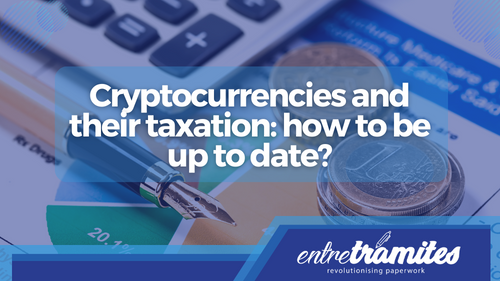Financial transactions with cryptocurrencies have become more and more common worldwide, especially after the COVID-19 pandemic when there was an interruption in global production. Therefore, people have relied on these assets that would serve as a ‘store of value’ that resists inflation caused by monetary expansion.
At least in Spain, according to the Statista Global Consumer Survey, 10% of the population already uses or owns cryptocurrencies such as bitcoin, that is, more than 4 million people. This interest is seen mainly in the younger generations, in which more than a third of millennial millionaires have half of their wealth in cryptocurrencies and 50% own NFTs, according to the CNBC Millionaire survey.
For this reason, the Treasury is inspecting these digital assets very carefully due to the tax reform called by the Minister of Finance, María Jesús Montero, who seeks to redesign taxes to better tax digital currencies.
However, there are still many doubts about how these assets are managed, mainly about how cryptocurrencies are taxed, when they must be declared, what taxes must be paid, and even what penalties offenders may face if they do not comply with the Treasury.
For this reason, this article highlights some brief answers from the expert Fuster-Fabra, partner of Fuster-Fabra Abogados to clarify these doubts. However, we invite you to download our complete guide on The Taxation of Cryptocurrencies in Spain where the step-by-step is indicated to be up to date with your ‘cryptos’ and Treasury.
Does it is included in taxes?
According to the expert, cryptocurrencies virtually represent a value, so they are accounted for as part of the owner’s assets and must declare their possession in the Wealth Tax (IP) if they are a tax resident in Spain and if they exceed the legal threshold for it (2,000,000 euros). This is because it is part of the wealth of the taxpayer.
In the case of Personal Income Tax (IRPF) and Inheritance and Donation Tax, they must also be declared, thanks to the profits that they can give the owner during the year with cryptocurrencies.
It should be noted that receiving cryptocurrencies as an inheritance or as a gift is also taxed, in accordance with state and regional inheritance legislation. In other words, tax residents in Spain must declare the value of digital currencies that leave them under rates ranging from 7.65% to 34% according to the state regulatory framework, but this depends on the rates established by each autonomous community.
Buy cryptocurrencies but not sell them, do I also have to declare them?
The answer is: that it depends. According to Fuster-Fabra, in the IRPF it will be necessary to declare the profits that report the yields, transmissions, or sales of cryptocurrencies. The amount you have “must be included in the tax base of income tax savings.” However, this would be an informative statement, only to specify cryptocurrency operations.
On the other hand, it is mandatory to declare cryptocurrencies at two other times:
- When the taxpayer is obliged to present the wealth tax.
- When the cryptocurrencies are abroad and exceed a value of 50,000 euros and, once declared, each following year in which the change in value exceeds 20,000 euros.
To learn more about these conditions, you can consult our complete guide here.
Does the purchase of cryptocurrencies have VAT?
The answer is NO. The purchase of virtual currencies is exempt from VAT for both the buyer and the seller. According to current regulations, VAT is only applied for the purchase of goods and services.
What percentage of the winnings do you have to pay?
It should be remembered that the Income Tax is progressive, but it varies between 19% and 26%, depending on the volume of the profit obtained on the capital increases recorded. That is, if the amount of money that will be paid depends on the operation with cryptocurrencies has been more or less convenient.
Penalties for not paying correctly
The General Tax Law establishes various sanctions for situations such as: failing to enter the tax debt, breaching the obligation to present it completely and correctly, improperly requesting refunds or tax benefits, improperly determining or accrediting positive or negative items or apparent tax credits, etc..
The offense can entail an economic sanction from 50% of the regularized tax rate if it is classified as minor or up to 150% if it is classified as serious, explained the lawyer Fuster-Fabra.
Finally, these are some of the most popular doubts that we hope these answers will help to clear up all the confusion. Likewise, you can always count on our complete guide on The Taxation of Cryptocurrencies in Spain where more questions are answered in detail and there is a step by step to stay up to date with your virtual currencies and the Treasury.
You can download it on the button below:
Do you need more information about Cryptocurrencies and their taxation?
We want to listen to you and know what your questions are about the procedures you have to carry out. Count on the advice of our experts to clarify all your doubts.
At Entre Trámites we invite you to learn about our services. Fill in our contact form and we will call you to help you as soon as possible, schedule a free online consultation, or simply text our WhatsApp.





